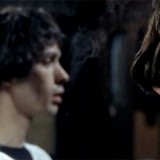I had no particular expectations from this film. I believe a film synopsis has this ingrained tendency to misrepresent sometimes. In this film Bernardo Bertolucci takes you to his early days in cinema, during the tumultuous late 60’s. It’s highly experimental, with erratic jump cuts, inconsistent plot line, political propaganda (Free Vietnam!) and occasional stylistic scenes that stand aloof just because of their aesthetics. A memorable scene is the giant shadow on a building that kicks away a smaller shadow of the main character.

The film is based on a short story by Dostoyevsky “The Double.” Bertolucci modified it a bit to tell the story of Jacob (Pierre Clémenti) a lonely theater teacher who invents his double, yet a much more extrovert and fierce copy. Cast members you may recognize include Stefania Sandrelli, Sergio Tofano, and Ninetto Davoli (Pasolini’s favorite actor). At the time films required by law to use at least 2 film students, so Bertolucci figured the more the merrier and included dozen students from the Experimental Film Centre in Rome.
I found the film hard to watch because of its incoherent storyboard and over experimentalism. It all made sense though when I watched the interview with Bertolucci in the bonus material. He then reveals the fact that he didn’t find himself connected to the mainstream commercial cinema of the 60’s in Italy – mostly comedy. Instead he opted to follow the French New Wave cinema. So his mission was to contradict the status quo in almost every scene he made.
Another interesting fact he shares, and I wonder if any of you readers can validate, Italian directors at the time never recorded the sound of actors on location – only visuals. They always dubbed it later in the editing room, whereas Bertolucci claims to be the first to capture both visual and audio from his actors. Fascinating!

